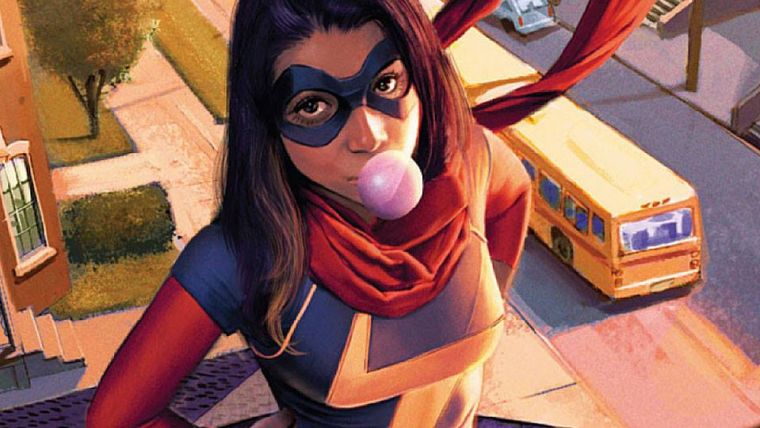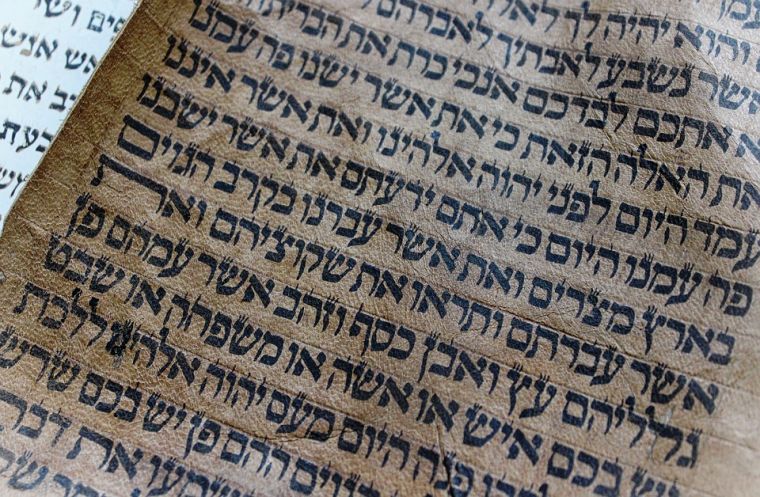A Muslim superhero for the age of Trump? It's a deeply biblical idea
A Muslim female superhero is joining the ranks of the US TV show DC's Legends of Tomorrow, in a bid for inclusivity in response to the divisive election of Donald Trump. The direction toward diverse representation is one increasingly common in popular culture, and is one Christians should applaud – because it's thoroughly biblical.

'You might have heard there was this election,' joked Mark Guggenheim, the executive producer of the CW network's DC's Legends of Tomorrow, announcing the move last Wednesday, according to Variety.
'Not to get political, but something that we all gravitated toward in the writers room was making this character Muslim.'
Tala Ashe is the actress playing the Muslim character Zari Adrianna Tomaz on the show. Speaking about the creative move, she said: 'Representation is a really powerful thing. When I was growing up watching television, I didn't see anyone who looked like me. When I think of the kid version of myself, I think it broadens your perspective.'
A recent study by Pew Research Centre found that most US Muslims do not feel welcome in America. Ashe told Buzzfeed: 'Because of the climate of our world and what's going on, I think the depictions primarily in media and of course in the news have been overwhelmingly negative about Muslims and Muslim-Americans. So I think it's even more essential.'
The bid for diversity is one that's become increasingly familiar in pop culture artistry. The news of a female lead for Doctor Who (After 13 male actors filled the role) was widely celebrated as a progressive victory, providing a new role model for young girls across the world and challenging assumptions about established gender roles.
In 2015, Star Wars Episode VII broke new ground for the franchise by casting both a woman (Daisy Ridley) as the empowered hero, and a black lead (John Boyega) alongside her. Returning to the superhero world, in 2013 Marvel Comics created the new character Kamala Khan, aka 'Ms Marvel', a Pakistani heroine and Marvel's first Muslim character to headline their own (award winning) comic book.
The list goes on. Ethnicity, sexuality, gender, physical ability – pop culture is increasingly making efforts to include and represent humanity's rich diversity.

Sometimes attempts at inclusion can end up feeling tokenistic, patronising or unhelpful – especially if they perpetuate the stereotypes they were hoped to combat. Christians of course, sometimes ripe for caricature, haven't always seen the most generous depictions in TV and film, but like The Simpsons' jovial evangelical Ned Flanders, they can surely weather it with a little grace.
Overall though, the widening of the imagination and the move to include as much as possible is a thoroughly biblical one. On one level, diversity in art is partly just about being truthful to reality, and an an extension of Christian love and generosity, seeking to welcome, listen and include all who are made in the image of God.
But the big picture of Scripture has radical inclusion, often of those believed to be far beyond the pale, at its core. God chose a specific nation – the children of Abraham – to be 'his people' but he also geared that community to be open to outsiders, and promised it would not only receive a blessing but be the means of blessing for the entire world.
In Genesis, we see the Egyptian slave Hagar cast off and despised from the family of Abram – but she is, as she declares, 'seen' by God who hears her misery. She gives birth to Ishmael, from whose line the Muslim prophet Muhammad would come.
In the story of Joshua, the Canaanite prostitute Rahab is saved from the destruction of Jericho, brought into the people of Israel and remembered throughout Scripture not as a harlot but as a hero.
Ruth, the hero of the Old Testament book bearing her name, is a Moabite, an ethnic outsider who married into the Hebrew family. Through her King David, and subsequently Jesus, are born. When the Hebrew prophets chastise the people, they highlight the forgotten voices of the poor, the orphan and the widow.

Jesus, a humble carpenter from the 'nowhere' of Nazareth, famously frequented with those despised by the mainstream: the Jewish Messiah ate and drank with prostitutes, tax collectors and sinners. To the woman caught in adultery and the ostracised woman at the well, Jesus offered grace where others poured scorn. He taught his followers to see the light of God in those considered enemies to the Jewish people, from Roman officers to Samaritan neighbours.
It's then the work of Christ that finally opens out God's mission not just to the Jewish people but to the entire world – and it's this message of salvation for the Gentiles that the Apostle Paul (once a persecutor of Christians) takes forward. In the book of Revelation an old world ends and a new one begins, and all the nations stand together.
Although sometimes imagined as the voice of the oppressive old guard or 'in group', Scripture hosts a diverse witness of voices that constantly challenge the reader to look outward and welcome the forgotten. As Jesus warned those who thought they had God's blessing in a box: 'the last will be first, and the first will be last'.
We now inhabit a globalised world that seems to promise that kind of utopian diversity and connection but in reality still discriminates and ignores. That's a tragic tendency entrenched in human nature, but it doesn't have to win.
Human beings will always tell stories, and those stories – for better or for worse – will always shape us. Like the Bible before them, many modern pop culture forms now offer a challenge we'll always need: they invite us to imagine a bigger world.
You can follow @JosephHartropp on Twitter











